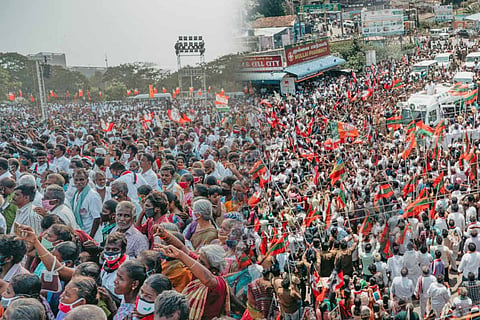

If one sees the massive crowds at political rallies, one would find it difficult to believe that COVID-19 cases are once again on the rise in the country. A close examination of these swelling crowds will show us that most people are not wearing masks and very evidently, physical distancing is a thing of the past. The very same political leaders, who were asking citizens to be cautious and maintain at least six-feet distance to curb the spread of coronavirus, are addressing these massive crowds of supporters in poll-bound states.
While this is not the first time elections are being held after the onset of the pandemic, the very scale of these elections, with the governments of five states at stake, leaders of political parties across the spectrum and their supporters have prioritised elections campaigning over safety measures. TNM spoke to a campaign manager of a Dravidian party who said that party workers are volunteering for fieldwork despite COVID-19.
“The cadre waits for elections because this is the time when they can also get some extra income. We could see they were getting restless for the elections and when we saw them lining up at the party office much before the actual campaigning began, we realised that rallies will be no different this time too; and that the crowds will come,” he said.
The Tamil Nadu government allowed for social, political, sports, educational and cultural gatherings across the state from December 19 onwards. The guidelines were that all standard procedures including masks, sanitisation and physical distancing should be followed and that only 50% capacity be allowed in both open spaces and indoor.
On April 1, Tamil Nadu Chief Secretary Rajeev Ranjan issued orders to District Collectors asking them to enforce COVID-19 guidelines strictly, and asked them to ensure the “enforcement of social distancing, the district administrations, as far as possible, use the provisions of Section 144 of the Criminal Procedure Code (CrPC).”
But this has barely translated on the ground, as all political parties continue to compete for larger crowds in their rallies and all leaders, including Chief Minister Edapaddi Palaniswami, seem to be flouting the norms. Meanwhile, for non-political activities, including weddings, restrictions continue to be applied. As on April 2, Tamil Nadu reported 3,290 fresh cases of COVID-19.
Meanwhile, Kerala, which has seen a rollercoaster ride viz-a-viz the surge in COVID-19 numbers, has done away with quarantine for domestic tourists planning to stay less than seven days. If their stay is for more than seven days, they need to submit a COVID-19 negative certificate. As of April 2, Kerala has a total of 1,124,584 cases, making it the state with the second-highest COVID-19 cases in the country.
According to the Union government data, India has seen a massive surge of 81,441 COVID-19 cases in the last 24 hours, with a total of 1,23,03,131 cases active across the country.
Meanwhile, the neighbouring state of Karnataka, which has 9,97,004 cases, though lesser than Kerala but slightly more than Tamil Nadu, has imposed fresh restrictions on April 2, with the state enforcing work from home for offices, closure of gyms and swimming pools, and permitting only prayers at religious places, forbidding any gatherings.
Experts believe that the real surge in these poll-bound states will start reflecting over the next 10 days. Ironically, as evidenced on social media, the COVID-19 protocols are being strictly enforced while voting, with physical distancing and masks being mandatory but caution is thrown into the wind while campaigning just before.